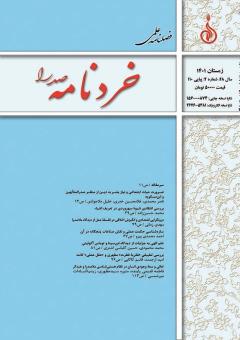درونگرایی اشتدادی و انگیزش اخلاقی در فلسفة عمل از دیدگاه ملاصدرا
محورهای موضوعی : ملاصدراپژوهی و اندیشۀ حکمت متعالیه
1 - دانشیار دانشکده الهیات دانشگاه پیام نور، تهران، ایران
کلید واژه: درونگرایی اشتدادی, انگیزش اخلاقی, فلسفۀ عمل, ملاصدرا,
چکیده مقاله :
این نوشتار با روش توصیفی ـ تحلیلی به بررسی دیدگاه ملاصدرا دربارة انگیزش اخلاقی پرداخته است. ملاصدرا در آثار خویش، برای مبدأ انگیزشی انسان برای انجام فعل، دو نوع تبیین ارائه داده است: تبیین ماهوی و تبیین اشتدادی. او در تبیین ماهوی هماهنگ با فیلسوفان پیش از خود، گاه انگیزش را به حلقة اول از مبادی صدور فعل یعنی شناخت و تصور (داعی) نسبت داده، اما در بیشتر موارد عامل اصلی انگیزش را به حلقة دوم یعنی شوق مربوط میداند. شوق پس از ادراک (تصور و تصدیق) و پیش از اراده (اجماع و عزم)، حالتی انگیزشی در فاعل ایجاد میکند. بر اساس این تبیین، ممکن است فاعل، خوبیِ فعل را درک و تصدیق کند اما نسبت به آن شوق نداشته باشد و نیز احتمال دارد امری را که نسبت به آن شوق دارد، اراده نکند و بنابرین میان این سه مرحله رابطهيی امکانی تصویر میشود. بر اساس تبیین وجودی و اشتدادی، میان ادراک، شوق و اراده پیوندی عمیق و ذاتی وجود دارد که از آن میتوان به «درونگرایی اشتدادی» تعبیر نمود. اعتقاد ملاصدرا به 1) سریان علم، شوق و اراده در سراسر وجود، 2) هویت واحد نفس و وحدت قوا و افعال و 3) نقش دوگانة شناختی ـ انگیزشی عقل عملی، دلايلی است که میتواند به تبیین این نوع از درونگرایی در دیدگاه او کمک نماید.
Following a descriptive-analytic approach, the present study investigates Mullā Ṣadrā’s view of moral motivation. He has provided two types of explanation, quiddative and graded, for man’s source of motivation for doing acts in his works. In his quiddative explanation, in line with his preceding philosophers, he attributes motivation to the first loop of the origins of emanation of act, that is, cognition and imagination. However, in most cases, he believes that the main source of motivation is related to the second loop or desire. The desire emerging after perception (concept and judgement) and before free will (consensus and resolution) motivates the doer. Accordingly, the doer might perceive and affirm the goodness of the act but not feel enthusiastic about it. However, it is also possible that they do not put their mind to doing the act they feel enthusiastic about. Hence, a contingent relation develops among the three stages. Based on the ontological and graded explanation, there is a profoundly essential unity among perception, desire, and free will, which can be interpreted as “graded introversion”. Mullā Ṣadrā’s belief in three factors, including the flow of knowledge, desire, and free will all through existence; the single identity of the soul and the unity of potentials and acts, and the dual cognitive-motivational role of practical reason, are the reasons that can contribute to explaining this type of introversion in his approach.
